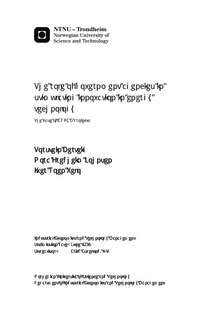| dc.contributor.advisor | Aspelund, Arild | nb_NO |
| dc.contributor.author | Velo, Iver Roen | nb_NO |
| dc.contributor.author | Johnsen, Nora Fredheim | nb_NO |
| dc.contributor.author | Berteig, Torstein | nb_NO |
| dc.date.accessioned | 2014-12-19T14:31:00Z | |
| dc.date.available | 2014-12-19T14:31:00Z | |
| dc.date.created | 2014-09-09 | nb_NO |
| dc.date.issued | 2014 | nb_NO |
| dc.identifier | 745166 | nb_NO |
| dc.identifier | ntnudaim:11738 | nb_NO |
| dc.identifier.uri | http://hdl.handle.net/11250/266843 | |
| dc.description.abstract | The pressing need for increased sustainability in the energy system combined with underinvestment in new energy technology demonstrates the need for government initiatives to drive innovation in the energy sector. In this thesis, we have investigated how design characteristics of a government agency intended to support market focused energy technology innovation affect the projects in its portfolio, and consequently suggested considerations that should be made in the design of such an agency on the basis of our findings.Our focus is on the level of individual projects being supported by such programs. An embedded single-case research design was chosen, where the units of analysis were projects supported by the U.S. agency ARPA E. The primary source of data was semi-structured, open-ended interviews with representatives from 13 projects in California. Following our research, the following findings emerge: The innovation process of projects within early-stage, transformative high-risk energy technology is affected by design characteristics related to the program design, project selection process and the support provided by an active management model in the agency. The organizational structure of the agency and the quality of its managing officials are important moderators of these factors.As guidance to policy makers, we establish the order of importance of design considerations to be made in the creation of such an agency. This thesis contributes to theory by presenting an integrative framework of interlinked factors describing these effects, as well as a cohesive portfolio of rationales for government intervention in energy sector innovation. | nb_NO |
| dc.language | eng | nb_NO |
| dc.publisher | Institutt for industriell økonomi og teknologiledelse | nb_NO |
| dc.title | The role of government agencies in stimulating innovation in energy technology: The case of ARPA E projects | nb_NO |
| dc.type | Master thesis | nb_NO |
| dc.source.pagenumber | 137 | nb_NO |
| dc.contributor.department | Norges teknisk-naturvitenskapelige universitet, Fakultet for samfunnsvitenskap og teknologiledelse, Institutt for industriell økonomi og teknologiledelse | nb_NO |

